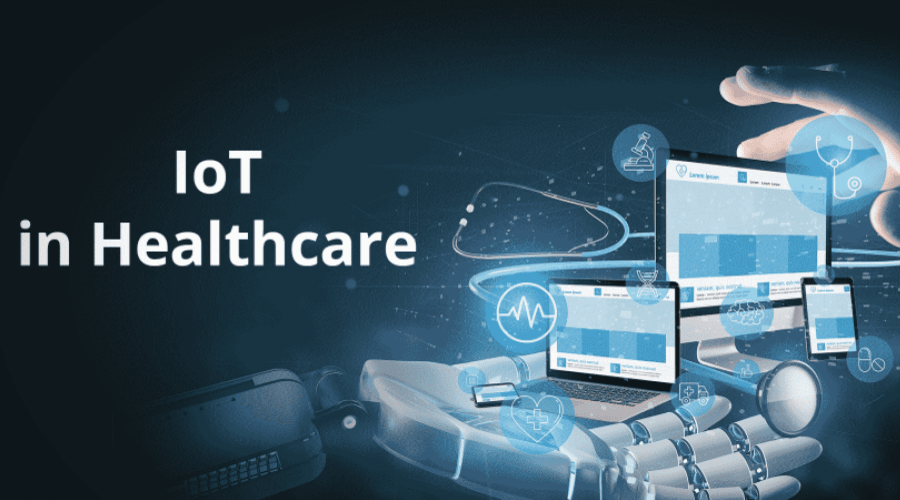The convergence of Blockchain technology and IoT has the potential to revolutionize the healthcare industry by enhancing security, interoperability, and data management. In this article, we will explore how these technologies are reshaping the healthcare landscape and improving patient care.
What is Blockchain?
Blockchain is a decentralized, distributed ledger technology that enables secure and transparent transactions. It operates on a peer-to-peer network and utilizes cryptographic algorithms to ensure immutability and data integrity.
In simpler terms, a blockchain is like a digital ledger that records transactions or information in a series of blocks. Each block contains a set of data and a unique identifier called a hash. These blocks are connected to each other in a chronological order, forming a chain of blocks.
What sets blockchain apart is its decentralized nature. Instead of having a central authority, such as a bank or government, controlling the ledger, blockchain relies on a network of computers, known as nodes, to validate and store transactions. This decentralization makes blockchain resistant to tampering and hacking since altering a single block would require changing all subsequent blocks on the chain, which is computationally infeasible.
What is IoT?
The Internet of Things (IoT) refers to the network of interconnected devices that collect and exchange data. These devices, ranging from wearable sensors to medical equipment, enable real-time monitoring, data sharing, and automation in healthcare settings.
Intersection of Blockchain and IoT
The integration of Blockchain and IoT can address the challenges of data security, privacy, and trust in healthcare systems. By combining the tamper-resistant nature of Blockchain with the vast data generated by IoT devices, healthcare providers can create a secure and interoperable ecosystem.
Benefits of Blockchain Technology in Healthcare
Blockchain technology offers numerous benefits in the healthcare industry. Here are some of the key advantages:
- Enhanced Data Security: Blockchain technology provides a highly secure framework for storing and sharing sensitive healthcare data. It uses cryptographic techniques to ensure data integrity and immutability. Each transaction or record is cryptographically linked to the previous one, making it nearly impossible for unauthorized parties to alter or manipulate the data. This robust security feature is especially crucial in protecting patient health records and sensitive medical information from breaches and unauthorized access.
- Interoperability and Data Exchange: Healthcare systems often suffer from interoperability issues, with data scattered across various providers and platforms. Blockchain technology enables seamless interoperability by creating a decentralized and standardized platform for data exchange. It allows different healthcare providers, institutions, and systems to securely access and share patient data, facilitating better coordination of care, reducing duplicate tests, and improving overall efficiency.
- Transparency and Auditability: Blockchain’s transparent nature promotes trust and accountability in healthcare. Each transaction recorded on the blockchain technology is visible to all participants, creating an auditable trail of activities. This transparency enhances trust among patients, healthcare providers, and regulatory bodies. Patients can have greater visibility into who accesses their health data, and healthcare organizations can ensure compliance with regulations and ethical standards.
- Streamlined Administrative Processes: Blockchain technology has the potential to streamline administrative tasks in healthcare. It eliminates the need for intermediaries and third-party verification, reducing administrative costs and delays. Smart contracts, built on top of blockchain technology, automate and enforce contract terms, ensuring timely payments, insurance claims processing, and supply chain management. This automation improves efficiency, reduces paperwork, and minimizes errors or fraud.
- Facilitation of Research and Development: Blockchain can significantly benefit medical research and development. It enables the secure sharing of research data across institutions and borders, allowing researchers to collaborate more effectively. Additionally, blockchain-based platforms can incentivize data sharing by providing a transparent and traceable mechanism for compensating individuals who contribute their data for research purposes. This open and collaborative approach has the potential to accelerate medical discoveries and advancements.
Benefits of IoT in Healthcare

IoT devices in healthcare enable remote patient monitoring, real-time data collection, and predictive analytics. These capabilities improve patient outcomes, enable proactive interventions, and reduce hospital readmissions. IoT also facilitates telemedicine and remote consultations, enabling access to healthcare services in underserved areas.
Challenges of Blockchain in Healthcare
- Scalability: Blockchain systems face scalability limitations in terms of transaction processing speed and capacity. As the number of transactions increases, the blockchain network can become slower and less efficient. In healthcare, where large volumes of data need to be processed and shared, scalability becomes a critical concern. Overcoming scalability challenges requires the development of innovative solutions and optimization techniques to ensure that blockchain networks can handle the growing demands of the healthcare industry.
- Regulatory Compliance: Healthcare is a highly regulated industry with strict data protection and privacy regulations, such as HIPAA (Health Insurance Portability and Accountability Act). Integrating blockchain technology while ensuring compliance with these regulations can be complex. Blockchain-based systems need to adhere to privacy and security standards while enabling data sharing and access control. Achieving regulatory compliance requires collaboration between blockchain developers, healthcare providers, and regulatory bodies to establish frameworks that address legal and ethical considerations.
- Interoperability with Legacy Systems: Healthcare organizations often rely on legacy systems for storing and managing patient data. Integrating blockchain technology with these existing systems can be challenging due to compatibility issues and varying data formats. Ensuring interoperability between blockchain networks and legacy systems is crucial to enable seamless data exchange and enhance the overall efficiency of healthcare operations. Developing standardized protocols and interfaces can facilitate the integration of blockchain technology into the existing healthcare infrastructure.
- Collaboration and Adoption: Widespread adoption of blockchain technology in healthcare requires collaboration among various stakeholders, including healthcare providers, technology vendors, regulators, and patients. Establishing trust and cooperation among these parties can be a challenge, as each may have different priorities and concerns. Building consensus on standards, governance models, and data sharing protocols is essential to create a cohesive and interoperable blockchain ecosystem in healthcare.
- Legal and Ethical Considerations: Blockchain technology raises legal and ethical considerations related to data ownership, consent, and liability. As patient data is stored and shared on a decentralized blockchain technology network, ensuring the privacy and security of sensitive information becomes critical. Clear guidelines and regulations need to be established to address issues such as patient consent, data governance, and dispute resolution. Addressing these legal and ethical considerations is crucial to build trust and ensure the responsible use of blockchain technology in healthcare.
Overcoming these challenges requires a collaborative effort from healthcare stakeholders, technology experts, and regulators. By addressing scalability issues, ensuring regulatory compliance, promoting interoperability, fostering collaboration, and addressing legal and ethical considerations, the potential of blockchain technology can be fully realized in the healthcare industry.
Challenges of IoT in Healthcare
IoT deployment in healthcare poses challenges related to data security, device interoperability, and data management. The sheer volume and variety of IoT devices increase the risk of data breaches and cyber threats. Additionally, integrating IoT devices with existing healthcare systems and ensuring data integrity are ongoing challenges.
Use Cases of Blockchain in Healthcare
Blockchain technology finds applications in healthcare, such as secure medical record sharing, clinical trials, supply chain management, and drug traceability. It can enable patients to have control over their health data, facilitate seamless data exchange among healthcare providers, and ensure the authenticity of medical products.
Use Cases of IoT in Healthcare
IoT has numerous use cases in healthcare, including remote patient monitoring, smart hospitals, asset tracking, and medication adherence. IoT devices provide real-time data on patient vitals, automate inventory management, optimize resource utilization, and improve patient safety and care coordination.
Security and Privacy Considerations
When implementing Blockchain technologyand IoT in healthcare, security and privacy must be prioritized. Measures like encryption, access controls, and secure communication protocols should be in place to protect patient data from unauthorized access. Compliance with data protection regulations and the ethical use of data are crucial considerations.
Future Trends in Blockchain and IoT
The future of Blockchain and IoT in healthcare is promising. Advancements in technologies like edge computing, AI, and machine learning will further enhance the capabilities of these systems. Additionally, the adoption of interoperability standards, increased collaboration, and regulatory frameworks will drive the widespread implementation of these technologies.
Conclusion
In conclusion, the convergence of Blockchain and IoT has the potential to transform healthcare by improving data security, interoperability, and patient care. While challenges exist, the benefits of these technologies in healthcare are significant. It is crucial for healthcare organizations to explore and embrace these advancements to unlock the full potential of Blockchain and IoT in healthcare.
FAQs
How does Blockchain enhance data security in healthcare?
Blockchain ensures data security in healthcare by using cryptographic algorithms, decentralization, and consensus mechanisms to make data tamper-resistant and transparent.
Can IoT devices improve patient outcomes in healthcare?
Yes, IoT devices enable remote monitoring, real-time data collection, and predictive analytics, which contribute to improved patient outcomes by enabling proactive interventions and personalized care.
What are the challenges of implementing Blockchain in healthcare?
Some challenges include scalability, regulatory compliance, interoperability with legacy systems, collaboration among stakeholders, and addressing legal and ethical considerations.
How does IoT contribute to the automation of healthcare processes?
IoT devices automate various healthcare processes such as inventory management, patient monitoring, and asset tracking, which reduce manual tasks, improve efficiency, and optimize resource utilization.
What are the security considerations when implementing Blockchain and IoT in healthcare? Security considerations include encryption, access controls, secure communication protocols, compliance with data protection regulations, and ethical use of data to protect patient information from unauthorized access.






